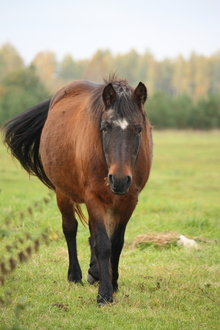Dr. Getty announces a new feature, âResearch Reflections,â insights on relevant nutrition research and how it impacts your horses' health, in her bi-monthly newsletter, Forage for Thought. Subscribe for free at www.GettyEquineNutrition.com. The following is the first to be featured:

Learn more about nutrition and horse health
Dr. Getty announces a new feature, âResearch Reflections,â insights on relevant nutrition research and how it impacts your horses' health, in her bi-monthly newsletter, Forage for Thought.
Prebiotics may reduce inflammation in aging horses
Researchers from the University of Kentucky evaluated âinflamm-agingâ â an increase in inflammatory mediators found in aging horses that can affect their ability to resist infection, respond to vaccination, and defend against age-related conditions.
Forty horses ranging in age from 20 to 33 years old were involved in this study. The goal was to see if feeding a prebiotic or a fish-oil derived omega-3 fatty acid (DHA) would improve the immune response to vaccinations as well as reduce overall inflammation.
Result: The inflammatory response, measured by three specific cytokines, was significantly reduced in horses receiving the diet containing prebiotics. Omega 3s had no impact of inflammatory markers. Neither diet had an effect on vaccination response.
Implications for your horses:
The prebiotic supplement used in this study was a proprietary blend currently added to a popular senior feed. Consequently, we cannot know the exact ingredients. But it is reasonable to assume that it contains substances that are typically included in quality prebiotic supplements.
A prebiotic promotes the growth of beneficial bacteria in the horseâs hindgut. It does not contain live organisms. Prebiotics often include bacterial fermentation products, as well as oligosaccharides, beta glucan, and yeast extract.
A healthy microbial population is an important aspect of a well-functioning immune system. Favorable microbes can prevent harmful bacteria from multiplying by binding them and carrying them out of the horseâs body. As exhibited by this study, promoting a robust bacterial population through prebiotic supplementation helps lower inflammatory cytokines.
Of note is the lack of inflammatory reduction in horses receiving omega 3s. It has been well documented that omega 3s reduce inflammation. This studyâs results may be due to only measuring a specific group of cytokines.
Study:
Adams, A.A., Vineyard, K.R., Gordon, M.E., Reedy, S., Siard, M.H., and Horohov, D.W., 2015. The effect of n-3 polyunsaturated fatty acids (DHA) and prebiotic supplementation on inflammatory cytokine production and immune response to vaccination in old horses. Journal of Equine Veterinary Science, 35(5), Abstract, 407-408.
Juliet M. Getty, Ph.D. is an independent equine nutritionist with a wide U.S. and international following. Her research-based approach optimizes equine health by aligning physiology and instincts with correct feeding and nutrition practices.
Dr. Gettyâs comprehensive resource book, Feed Your Horse Like a Horse, is available at www.GettyEquineNutrition.com -- buy it there and have it inscribed by the author, or get it at Amazon (www.Amazon.com) or other online retail bookstores. The seven separate volumes in Dr. Gettyâs topic-centered Spotlight on Equine Nutrition series are available with special package pricing at her website, and also at Amazon in print and Kindle versions. Dr. Gettyâs books make ideal gifts.
Find a world of useful information for the horseperson at www.GettyEquineNutrition.com: Sign up for Dr. Gettyâs informative, free e-newsletter, Forage for Thought; browse her library of reference articles; search her nutrition forum; and purchase recordings of her educational teleseminars. Reach Dr. Getty directly at gettyequinenutrition@gmail.com. She is available for private consultations and speaking engagements.
Article by By Juliet M. Getty, PhD
